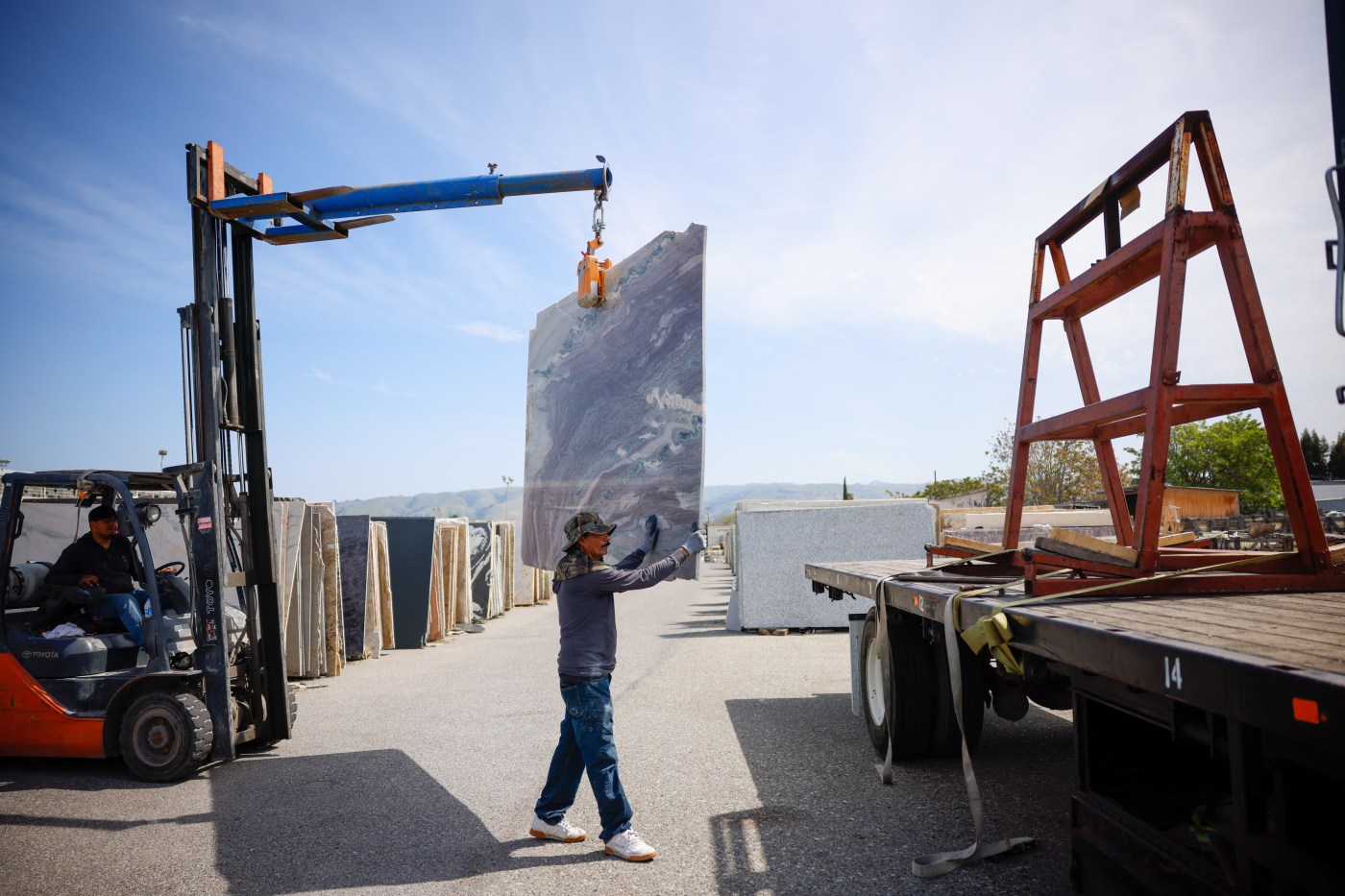
The day before Silicon Valley Granite owner Sridhar Kollareddy was forced to vacate his business of more than 20 years, he worked furiously into the early morning hours in an effort to move off the property as many 1,000-pound slabs of granite, marble and porcelain as he could.
Located in San Jose’s Little Portugal neighborhood, Kollareddy’s roughly 3-acre site stored 7,000 slabs of stone sourced from around the world that are used to make everything from headstones to countertops.
But the land is part of more than 9 acres seized by the Santa Clara Valley Transportation Authority using eminent domain to make way for a long-awaited BART extension. The transit agency, which is in charge of constructing the 6-mile, four-station line to extend BART from the Berryessa Transit Center in North San Jose through downtown and to Santa Clara, said it needs the land to build the 28th Street/Little Portugal station.
On April 25, Santa Clara County Superior Court Judge Shella Deen issued a court order, following a petition from VTA, that required Silicon Valley Granite to vacate the site by April 30. Any inventory left after that date, the judge ruled, would be considered abandoned and Kollareddy wouldn’t be entitled to any compensation. He said he learned of the news when the order was filed with the court on April 28, sending him into overdrive to relocate as many stone slabs as possible. He estimates the value of his inventory at several million dollars.
Sheriff’s deputies served Kollareddy with the court-ordered paperwork on Thursday, according to his attorney, Glenn Block of the California Eminent Domain Law Group. Block said his client has been given an additional 5-day notice. Next week, deputies will return to lock the gate and Kollareddy will have to abandon whatever is left. Block estimates he’ll be able to move out about 10% of the inventory before then. Each truck can deliver about 15 stone slabs at a time.
The landowner, Honco Investment, and several other tenants have already settled with VTA and mostly departed. But Kollareddy and Block said VTA has “repeatedly moved the goal posts” when it comes to his relocation and what he needs to do to receive appropriate compensation.
Court documents show that Silicon Valley Granite and VTA agreed that the business would vacate the property by March 31, 2024. When that deadline came and passed, the parties agreed to push the date out to April 30, 2025.
“The business owner was given two separate deadlines, beginning almost two years in advance, and chose not to leave the property or file for relocation reimbursement,” VTA said in a statement.
But Block said that VTA is mischaracterizing the situation. He said that Kollareddy worked with the transit agency’s consultants to try to find an auctioneer so he could sell off the rest of his inventory. Other estimates he received said that it would take six months to move everything, and Block said that VTA wanted that work to be done in 30 to 60 days — what he called an impossible task.
Since December 2020, when VTA first notified Silicon Valley Granite that it might need to move, Kollareddy has searched for relocation sites, but found the cost of rent out of his reach at $60,000 to $70,000 a month.
“I never said that I’m not going to move out,” he said. “I have to get fair compensation, then I’ll go.”
Since he hasn’t found a new location for his business, Kollareddy has enlisted the help of friends as far as Colma and Tracy to help him store the inventory.
An immigrant from Hyderabad, India, Kollareddy travelled to the United States in the 1990s to sell materials from his family’s quarry. He relocated to the U.S. in 1998 and eventually opened up his own business — at one point, he even had multiple locations. But when the housing bubble burst in 2008 and the recession hit, people stopped remodeling their homes and Kollareddy’s business suffered.
“I do it as a passion,” he said. “That’s why I’ve been doing it all my life.”
Silicon Valley Granite’s eviction comes as VTA officials struggle to bridge a $700 million to $1.2 billion funding gap for the BART extension project. The Federal Transit Administration announced in August 2024 that it could cover 40% of the cost of the $12.75 billion megaproject, less than the nearly $6.3 billion that local transit officials had sought.
The agency has been working on identifying cost savings, which has included converting the 28th Street/Little Portugal station’s parking structure to surface parking.
In a statement, VTA said the “timeline for the 28th Street station is not germane in this situation, as the business owner has failed to comply with previous agreements he made to leave the property. The BART Phase II project construction has begun and timelines for specific elements of the project are subject to change.”
This isn’t the only situation where VTA is using eminent domain to make way for the BART extension. The transit agency has been engaged in legal battles with several property owners in downtown San Jose, some of whom have said that VTA has hurt their economic prospects during what they described as a land grab. Some of VTA’s eminent domain efforts have also been abandoned altogether and might have caused developmental delays to a proposed 26-story apartment building.
Block, who has been an eminent domain attorney for more than two decades, called VTA’s actions “egregious.”
“This is the most egregious of the egregious,” he said of Kollareddy’s situation. “You can’t get any further on the spectrum as far as the government trying to deny fair treatment and deny compensation to a business owner.”
Kollareddy said he plans to keep fighting. If he doesn’t get VTA compensation, he said he’ll have to start all over again as his entire savings is tied up in his inventory.
“It’s one of the worst feelings,” he said. “I never expected this to happen in this country. Never.”